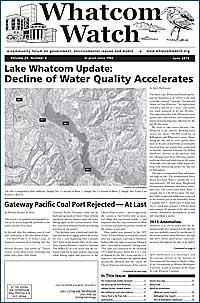by Kathryn Fentress
Julianna Fischer is a 22-year-old senior at Western Washington University who is graduating with a degree in Environmental Policy and minors in Energy Policy and Economics. She is being honored with the Community Service Award for her outstanding work in our community by Huxley College of the Environment.
Kathryn Fentress: Please, tell us what you have been doing today.
Julianna Fischer: I have been at Kulshan Middle School all day, teaching sixth graders a little about energy efficiency and energy conservation. The kids were very receptive and engaged and eager to learn how they can help save energy. These presentations are part of my internship on the Bellingham Energy Prize through the city of Bellingham and the Institute for Energy Studies at Western.
Bellingham is competing in a national competition for the Georgetown University Energy Prize. The winning city will receive $5,000,000 for the biggest reduction of energy use. Bellingham is currently tied for fourth place in the nation and is positioned to do really well in the next part of the competition. This competition is meant to promote energy efficiency innovation and create model cities that other communities can look to for progressive energy-saving programs and policies.
What an excellent project! What groups are participating?
There are nine local organizations who are involved, including the city, the schools, nonprofits and the utility companies. It’s been so great to see how these groups are working together and sharing information for the betterment of our community.
How did you become interested in the environment?
I am still trying to figure that out. There was a switch somewhere along the way. I came to Western and began taking a lot of the general required classes that everyone needs to take to graduate, the liberal arts type classes. I’d someday like to pinpoint what it was that compelled me to be interested in the environment; I think it was a quick transition. I became involved with Students for Renewable Energy a little over a year ago. I soon became president of the club and we’ve really grown this past year. We have an internal email chain of about 33, but those 33 are very committed and make a big difference. We have over 2,500 students currently on campus who have signed on to support us.
What kind of projects does the club address?
We take action to move beyond fossil fuels in a just transition toward sustainable energy systems, by engaging the community through education and advocacy for climate justice. In the Fall, we focused on the local County Council elections, Propositions 9 and 10, and making sure that folks on campus were registered to vote and getting the vote out. We are not a political club, but we get really involved in the local political process. Now, we are focusing on a divestment campaign to get the university to stop investing in fossil fuel companies. We are into the fourth year of this really interesting and complex campaign.
The University Foundation has already told us ‘no’ once, and we are revisiting this decision with Foundation staff. This year our main strategy was to step away from the flashy protest actions and sit down at the table and have meaningful conversations. When we sit down and share our concerns, we often find that we have more in common than not, which helps move us closer to action we can all feel good about. Currently, in line with being more strategic, we are working to get divestment language into the University’s 20-year sustainability plan. We also just started a new working group to work on local energy policy issues and creating meaningful change in the community, which I’m very excited about.
Excellent work! How would you characterize the students in general on campus?
Western is a green campus and there is a strong general sustainability mindset environmentally, socially and economically. Sometimes it feels that most students think this is enough, that they are part of the solution by attending school here. Many fewer students feel compelled to step up to another level, but those who do are really passionate about many intersectional issues including sustainable food, farmworker justice, sustainable water, and so on. The environmental clubs all work together empowering each other and supporting each other’s campaigns.
There is so much that needs changing. Do you get discouraged sometimes?
I do, but I like to use humor to get through those times. Plus I get a lot of positive benefits from doing this work: great friendships and opportunities and being able to feel like I’m making a difference. I have a lot of faith that things are quickly changing. Part of the failure of the environmental movement historically has been the way the issues have been presented: it’s been about the polar bears and future generations and about other people we will never know or meet. We need to talk about what is happening in our own communities. I avoid calling myself an environmentalist because it seems so limiting. We talk about the environment as if we’re not a part of it. I want people to know I care about clean water and clean air and about ecosystems and healthy children. I think we’re really moving in the right direction in this way.
What message would you like to share with our readers?
We can’t be afraid. Don’t be paralyzed by fear, take steps in the right direction, join a phone bank or knock on doors for an issue you care about. Talking to your neighbors isn’t scary. Making a difference is as simple as taking a first step, one that for me snowballed into something bigger. If you try something new, you may just like it and find out something new about yourself, and help to bring about a better world in the process. We need to envision the world we want to see and work together to get there, even if we do it for different reasons.
What are your plans after graduation?
Eventually, I want to return to my home state of Maine and be politically active there. I want to engage with that community and use what I’ve learned here in Bellingham to identify the gaps where my skills, knowledge and experience can make a difference, likely being a part of some campaign for policy change. I am keeping my options open for now. I’m not much of a planner — I like organic processes that unfold naturally and lead me from one door to the next. I have learned so much since coming here and have had many mentors: teachers, friends, community members, etc. I find it a blessing that I am on the frontline addressing the biggest issue of our time. The magnitude of the problems can be really daunting sometimes, but I think there’s also reason to be excited about that, that we now have the power to shape the future. I believe this decade is the one that we will look back on in the history books: the decade when the big changes happened.
Kathryn: Thank you, Julianna, for all of your outstanding work on campus and in our community. We wish you the best in your future endeavors and are confident you will continue to make an important difference in our world.
__________________________________
Kathryn Fentress and her husband moved to Bellingham 20 years ago for the water, trees, fresh air and mountains. She is a psychologist in private practice and believes that spirit is in everything. Living in harmony with nature reflects a reverence for life. She delights in finding and meeting those people whose stories so inspire all of us.





























